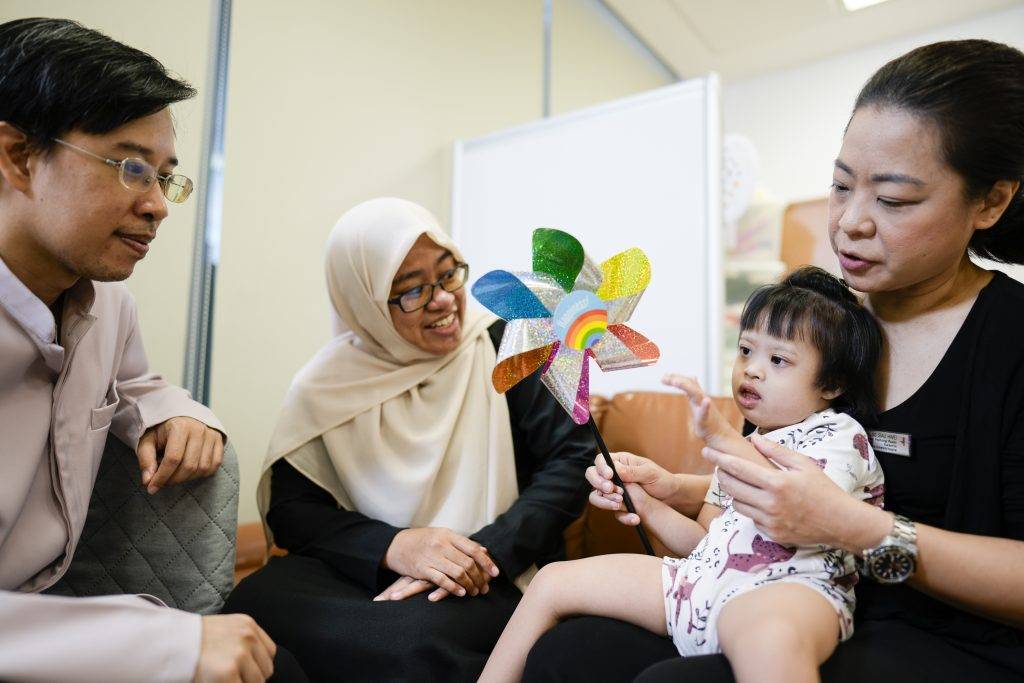The Child and Adolescent Family Support Services (CAFSS) programme at NUH, supported by the EtonHouse Community Fund (ECF), provides subsidised psychosocial support for families with chronic illness. For Mdm Adilah, this support was a lifeline in repairing strained family bonds following the diagnosis of their daughter Aafiyah.
When Mdm Adilah learned that her youngest daughter, Aafiyah, had a chronic kidney condition, she was overwhelmed. Aafiyah’s diagnosis compounded the stress of raising three young children, including two older daughters aged seven and six. The strain took a toll on the entire family, triggering anxiety in Mdm Adilah, behavioural changes in her older daughters, and a growing sense of disconnection.
“When she (Aafiyah) was hospitalised…I would have very high anxiety.” shared Mdm Adilah. Her past grief of losing a sibling and one of her own children added layers to her emotional burden.
In the complex landscape of chronic disease management, medical treatment often takes center stage, while the emotional and psychological toll on families remains in the background. This is where the Child and Adolescent Family Support Services (CAFSS) programme at the National University Hospital (NUH) stepped in, offering a lifeline to her family.
Approaching to Psychosocial Care At The Family Level
Launched in 2022 with funding from the EtonHouse Community Fund (ECF), CAFSS is Singapore’s first hospital-based initiative to provide subsidised psychosocial support for families with chronically ill patients. Beyond treating the patient, the programme supports parents, siblings, and children of adult patients, addressing the ripple effects chronic illnesses have on family dynamics and mental health.

For families like Mdm Adilah’s, the programme was a way to bring the family back together amidst the stress of managing a child with a chronic condition.
Therapy For The Family
Mdm Adilah’s eldest daughter underwent six sessions of talk therapy. These sessions focused on helping her articulate her emotions, identify her needs, and reduce tantrums.
“Before this, she wasn’t sure how to express what she was feeling. She would just throw tantrums,” shared Mdm Adilah.
The sessions taught the family how to intervene constructively during emotional outbursts and build skills to foster better communication.
Midway through her own therapy, Mdm Adilah and her therapist uncovered an issue – her unresolved grief from losing one of her child, the twin of her second daughter. This grief had unknowingly created a gap in her relationship with her second child, who reminded her of her loss.
The remaining four sessions shifted focus to art therapy, which included facilitated activities with her second daughter as a mother-daughter pair. These sessions helped Mdm Adilah process her grief and rebuild her bond with her child.
By the end of the sessions, her second daughter was more open to engaging in activities, and their relationship had significantly improved.
“I saw that how she was more open to do things with me as well as I learned to understand her better.” shared Mdm Adilah. “I see it as an opportunity how I could bond with her more through our daily activities.”
Breaking Negative Cycles & Improving Outcomes
The therapy sessions had great impact beyond the sessions alone.
“With the tools that I’ve learned through therapy, I’ve learned how to combat all these negative thoughts,” shared Mdm Adilah. “The tools that I’ve learned through [therapy]…I still apply it to this day.”
This emotional wellbeing even translated to better physical outcomes for patients – with a marked reduction of A&E visits, hospitalisations, sick days for the families who received CAFSS support.
Ms Ng Siau Hwei, Head, Psychology (Paediatrics), Khoo Teck Puat – National University Children’s Medical Institute (KTP-NUCMI), National University Hospital (NUH) shares her take:
“Research that tells us that psychological well being does impact on your physical health as well.” she explained.
A child’s adjustment to their condition is closely tied to their family environment, with caregiver stress directly affecting treatment outcomes. When families are supported, there is subsequent improvements in mood, anxiety levels, and overall coping abilities. This in turn can reduce medical escalations such as emergency visits.
Mdm Adilah echoed this sentiment. As the mother and the anchor of the family, becoming more resilient helped her to cope better and by extension, her whole family too. By the end of their therapy journey, their bond as a family had strengthened. The ability to navigate medical challenges as a family had also improved, and they are hopeful for the future.
Making Therapy Accessible
One of the barriers many families face when seeking psychosocial support is the cost. For families struggling with the financial strain of chronic medical conditions, therapy can feel secondary.
Through a generous $100,000 donation, ECF subsidised 80% of therapy costs for families in the CAFSS programme. Families co-pay just 20% of therapy sessions. Without this support, therapy sessions can range from $60 to $250 per session depending on the level of subsidy available.
Looking Ahead
Since 2022, CAFSS has supported nine families with over 140 therapy sessions for parents and siblings of children with chronic conditions. With ECF’s generous funding, the programme is expanding and aims to support 12 families in its next phase.
The small but dedicated team is careful about maintaining the programme’s close collaboration and coordination with families. “We hope to be able to very gradually scale this up without compromising the quality of care.” said Ms Ng, when asked about the future of the programme.
Even so, there are also plans to extend the programme further to families of adult patients with chronic illnesses, where the team sees an unmet need.
“We hope to also reach out to our adult counterparts, adults with chronic medical conditions whose children may have difficulties coping, and then we would like to see how we can better support them as well.” Ms Ng shared.
Programmes like CAFSS represent a holistic future for chronic disease management – addressing both the physical and emotional needs of patients and their families.

